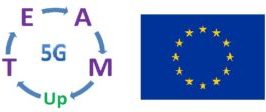
ESR 15
Diego González Morín
Application of 5G Ultra-Dense Networks for the distributed implementation of immersive media rendering
Research Gate: https://www.researchgate.net/profile/Diego_Gonzalez_Morin2
Google Scholar: https://scholar.google.com/citations?user=y5Il5_MAAAAJ&hl=es&oi=ao
Linkedin: https://www.linkedin.com/in/diegomorin/
Biography
I was born in the beautiful city of Madrid, Spain in 1993. I have always been very active, but since I turned 10, basketball has been a very important part of my life. I have played several Spanish championships and travelled all around Spain to play. During the last year, I also fell in love with sport climbing which, along with basketball, I practice several times a week.
I have always shown a great interest on technology, main reason why a decided to study a degree in Industrial Engineering which I finished in 2015. That same year, I started a double master program involving both KTH University in Stockholm and UPM in Madrid. In 2018 I finished both UPM´s Master Program in industrial engineering in Madrid and KTH´s Master Program in Systems, Control and Robotics. After I wrote my Master Thesis in Sweden in collaboration with Ericsson, I joined Ericsson Research in Stockholm as a full-time employee. This year, my Master Thesis was published as a conference paper in IEEE ICRA 2019.
During my time as an Ericsson Researcher, where I discovered my passion for research, I focused on Mixed Reality technologies. More specifically, I studied the implementation of remote haptic interaction and collaboration over ultra-low latency networks. Besides, I also researched the problem of occlusion handling in AR applications.
As part of the TeamUp5G project, I will focus on the implementation of optimized AR/VR solutions on ultra-dense network. This study will almost not focus on the remote rendering but mostly on the distributed AR/VR implementation and remote sensor/data real-time processing.
Objectives
The general goal of my project is to study the distributed implementation of AR/VR technologies on ultra-dense networks. In particular this goal can be subdivided in different objectives. As short-term goals, we have:
A. My first personal goal is to acquire a deep knowledge on telecommunications technologies and specifically, 5G Networks technologies.
B. We want to breakdown in low-level blocks both AR and VR technologies to study the communication channel requirements and data flow between such blocks. Besides, we want to research the state of the art of each individual block and analyze the processing/memory requirements for each block.
C. From the previous analysis, we want to extract a set of theoretical network and processing KPIs.
D. We started to implement a fully functional version of an Immersive AR Holographic Call. This application was chosen as most of the main requirements and technologies involved in AR are included. Besides, it puts a high demand on the network requirements.
E. When the application is finished, we want to gather data through experiments on the proposed applications. We want to use our 5G research antenna to validate or update the theoretical results obtained before.
F. Finally, we will perform experiments using the implemented application to study the quality of experience related to the network characteristics.
On the other hand, we also have a set of long-term organic goals which will be updated as the project evolves:
A. We want to upgrade the proposed pet application into an Immersive Remote Virtual Collaboration scenario in which two remote users can share the same virtual content and interact with it. Besides, we want that one of the users is wearing an AR device and the other one a VR device. As a consequence, not only the virtual content should be shared, but also, the real scenarios ‘virtual representation; both locations should be scanned and mixed with the virtual one. This is a very complex scenario that involves most of the AR/VR technologies and introduces several still open problems that could be studied within the 5G umbrella. Furthermore, virtual remote interaction adds an extra challenge that places the networks requirements on a higher level.
B. We want to repeat the experiments mentioned in the short-term goals on the Immersive Remote Virtual Collaboration proposed application.
C. Further experiments will be performed by studying how can the different blocks within the applications can be moved from the device to a remote machine, and how can it affect the quality of experience.
D. We also want to implement our own solution for some AR/VR still open problems such as occlusion, fast and accurate hand tracking, real scenario fast virtualization, etc.
Expected Results
The expected output from the project can be also divided in short and long-term results. The main expected short-term results are:
A. Block diagram of the AR and VR smaller processing blocks including:
– Data flow
– Processing Requirements
– Network KPIs updated from experiments
– Network Quality of Experience per block analysis.
B. Functional Immersive AR Holographic Call demo, along with generated media such as technical and promotional videos.
C. At least 2 publications:
– One describing the block diagram and its analysis along with some experimental results.
– Another paper describing the implementation work on the Holographic Call.
As long-term results, we have:
A. Functional Immersive Remote Virtual Collaboration app that can be used in demos and media.
B. At least a journal publication related on this application and its later experimental analysis.
C. Other conference publications related to the application implementation and/or network related analysis.
D. At least a conference publication about our own implementation of an AR and/or VR open problem such as occlusion, segmentation etc.
Institutions and Supervisors
- Main Institution: Nokia Bell Labs Spain
- PhD Enrollment: Universidad Carlos III de Madrid
- Academic Supervisor: Professor Dr. Ana Garcia Armada (Universidad Carlos III de Madrid)
- Industry Supervisor: Dr. Pablo Perez (Bell Labs Spain)
Secondments
Universidad Carlos III Madrid (UC3M): from 14th September 2020 to 14th December 2020
International Hellenic University (IHU): from January 2022 to March 2022
